|
|
|
Sort Order |
|
|
|
Items / Page
|
|
|
|
|
|
|
| Srl | Item |
| 1 |
ID:
011966
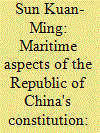

|
|
|
|
|
| Publication |
march 1997.
|
| Description |
98-109
|
|
|
|
|
|
|
|
|
|
|
|
|
|
|
|
| 2 |
ID:
010680
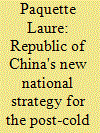

|
|
|
|
|
| Publication |
March 1996.
|
| Description |
1-39
|
|
|
|
|
|
|
|
|
|
|
|
|
|
|
|
| 3 |
ID:
188482
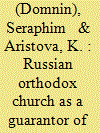

|
|
|
|
|
| Summary/Abstract |
TODAY, our compatriots in Latvia, as well as throughout the Baltic region, have to fight for the right to be Russian. The Russian language and the status of Russian speakers are among the most controversial issues in Latvia. Russophobia has become a key element of Latvian politics.
|
|
|
|
|
|
|
|
|
|
|
|
|
|
|
|
| 4 |
ID:
088143
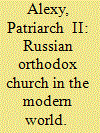

|
|
|
|
|
| Publication |
2009.
|
| Summary/Abstract |
THE INTERNATIONAL ACTIVITY of the Russian Orthodox Church today has four main areas of development. The first priority is to preserve the unity of the Church and ensure the spiritual life of the extensive church diaspora living outside the canonical territory of the Russian Orthodox Church (ROC). The second priority is to develop fraternal relations with all local Orthodox churches. The third priority is of a religious-public nature, and it is to maintain dialogue with other Christian confessions and organizations, as well as with representatives of Islam, Judaism, and Buddhism on matters relating to the preservation of moral values in the modern world. Finally, the fourth priority could be defined as the ROC's cooperation with the foreign policy agencies of various states, as well as with international public and interstate organizations in the interest of preserving peace and the fundamental values of public life.
Presently, the ROC is the largest local church in the Orthodox world. Orthodoxy is not an ethnic religion of Russians, Ukrainians, Belarusians, Moldovans or other peoples. It is global Christianity committed to preserving apostolic faith. It is open to the individual of any ethnic background. The church is a living and tangible embodiment of this principle, since it comprises representatives of numerous nationalities. The ethnic diversity of the Russian Orthodox Church is a source of its vitality and its weal.
One important goal of the Moscow Patriarchy is to preserve and uphold church unity, which is currently being confronted with some challenges. The unity of the church, bequeathed by the apostles, is a great value and should be appreciated as such not only by the bishops but also by each cleric and lay person. Church unity is the treasure that our predecessors preserved despite the ordeals that they had had to go through. This gift, augmented over centuries, cannot be dissipated overnight for the sake of time serving political considerations. Unfortunately, presently, there are ongoing attempts to destroy the sacred space of Holy Rus', created by St. Prince Vladimir, and spread discord and disharmony between millions of Orthodox Russians, Ukrainians, Belarusians, Moldovans, and representatives of other ethnic groups comprising the multiethnic flock of the Russian Orthodox Church
|
|
|
|
|
|
|
|
|
|
|
|
|
|
|
|
| 5 |
ID:
104243
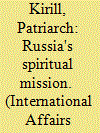

|
|
|
|
|
| Publication |
2011.
|
| Summary/Abstract |
By positing the prospect of eternity, religion can bring stability and predictability to a situation of uncertainty and conflict. The world economic crisis has demonstrated graphically that stable material prosperity is impossible without reliance on such fundamental concepts as spirituality, morality and goodness. Faith is a powerful source of spiritual values. It opens to the people the supreme meaning of existence, gives them hope for the victory of good, and endows them with energy for living.
|
|
|
|
|
|
|
|
|
|
|
|
|
|
|
|
| 6 |
ID:
177542
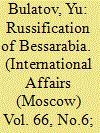

|
|
|
|
|
| Summary/Abstract |
IN FEBRUARY 1828, Emperor Nicholas I (1825-1855) signed the draft law Institution for Administering the Bessarabian Region that discontinued the experiment with the autonomy for the Pruth-Dniester interfluve. The "rights and freedoms" that Alexander I (1801-1825), his predecessor on the Russian throne, had granted to the local elite were replaced with the status of a province within the newly formed Novorossiyan-Bessarabian Governorship General, a new administrative unit in the South of Russia.
|
|
|
|
|
|
|
|
|
|
|
|
|
|
|
|
| 7 |
ID:
126979
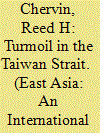

|
|
|
|
|
| Publication |
2013.
|
| Summary/Abstract |
Turmoil in the Taiwan Strait addresses Ambassador Wellington Koo's role in Chinese foreign policy from 1953 to 1956 and his relevance in the larger Cold War context. In particular, it focuses on Koo's involvement in the 1954 Sino-American Mutual Defense Treaty and the 1955 Dachen Islands Crisis. This paper argues that, although Koo accomplished a fair amount during this time, he would have encountered fewer professional obstacles had he not represented Chiang Kai-Shek, who had become a controversial figure by the mid-1950s. At the same time, one can conclude that Koo creatively used media and meetings with statesmen abroad to shore up support for the Republic of China during this turbulent decade. This article attempts to provide another perspective on Koo, who has traditionally been understudied in the West. Furthermore, this work seeks to add a meaningful contribution to the historiography on cross-strait relations-particularly in the contemporary era.
|
|
|
|
|
|
|
|
|
|
|
|
|
|
|
|
|
|
|
|
|